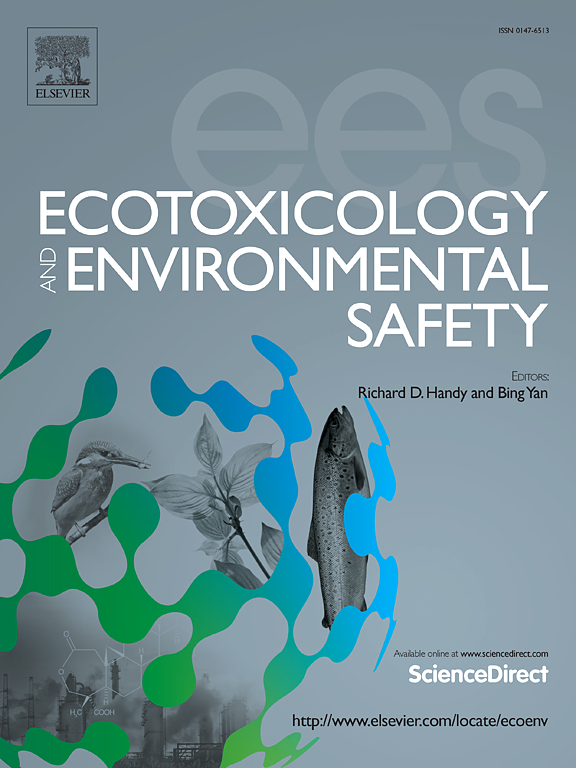Transcriptomics and metabolomics reveal the mechanism of cognitive impairment induced by long-term selenium deficiency in mice
IF 6.2
2区 环境科学与生态学
Q1 ENVIRONMENTAL SCIENCES
引用次数: 0
Abstract
As the aging population increases, cognitive impairment is emerging as a growing health issue worldwide. Low selenium status has been reported to correlate with cognitive decline in older adults. Nonetheless, the impact of prolonged selenium deficiency on cognitive function in adult mice and the underlying mechanisms remain poorly understood. In this research, male C57BL/6 J mice were given either a normal diet (0.2 mg/kg Se) or a selenium-deficient diet (0.02 mg/kg Se) for 24 weeks to evaluate the impact of long-term selenium insufficiency on their cognitive abilities. We performed hippocampus transcriptome sequencing, real-time PCR, Golgi-Cox staining, transmission electron microscopy, western blotting, and untargeted brain metabolomics to uncover the underlying regulatory mechanism. We found that chronic selenium deficiency impaired the capabilities of object recognition, spatial memory, and self-caring in mice, and disrupted the expression of key genes related to cognitive behavior, dendrite morphogenesis, and synaptic plasticity. Additionally, prolonged selenium deficiency compromised neurite integrity, decreased dendritic spine density, impaired synaptic ultrastructure, and reduced synaptic protein expression. Brain metabolomics revealed that differential metabolites (methylmalonic acid, N-acetyl-1-aspartylglutamic acid, and S-adenosylmethionine) may be involved in the process of cognitive impairment. These findings suggest that perturbation in cognition-related transcriptome profiles, lesions in neurites and synapses, and remodeling of the brain metabolic pattern are involved in the cognitive impairment induced by long-term selenium deficiency. Our study offers a new perspective on the pathogenesis of cognitive impairment, highlighting the critical role of selenium supplementation in maintaining healthy cognitive function.
转录组学和代谢组学揭示了长期缺硒导致小鼠认知功能障碍的机制
随着老龄化人口的增加,认知障碍正在成为一个日益严重的全球性健康问题。据报道,低硒状态与老年人的认知能力下降有关。然而,长期硒缺乏对成年小鼠认知功能的影响及其潜在机制仍然知之甚少。在本研究中,雄性C57BL/6 J小鼠被给予正常饮食(0.2 mg/kg Se)和缺硒饮食(0.02 mg/kg Se) 24周,以评估长期缺硒对其认知能力的影响。我们通过海马转录组测序、实时PCR、高尔基-考克斯染色、透射电镜、western blotting和非靶向脑代谢组学来揭示潜在的调节机制。我们发现,慢性硒缺乏损害了小鼠的物体识别、空间记忆和自我照顾能力,并破坏了与认知行为、树突形态发生和突触可塑性相关的关键基因的表达。此外,长期硒缺乏损害神经突完整性,降低树突棘密度,破坏突触超微结构,降低突触蛋白表达。脑代谢组学显示,差异代谢物(甲基丙二酸、n -乙酰-1-天冬氨酸和s -腺苷蛋氨酸)可能参与认知障碍的过程。这些发现表明,认知相关转录组谱的扰动、神经突和突触的损伤以及脑代谢模式的重塑与长期缺硒引起的认知障碍有关。我们的研究为认知障碍的发病机制提供了新的视角,强调了补充硒在维持健康认知功能中的关键作用。
本文章由计算机程序翻译,如有差异,请以英文原文为准。
求助全文
约1分钟内获得全文
求助全文
来源期刊
CiteScore
12.10
自引率
5.90%
发文量
1234
审稿时长
88 days
期刊介绍:
Ecotoxicology and Environmental Safety is a multi-disciplinary journal that focuses on understanding the exposure and effects of environmental contamination on organisms including human health. The scope of the journal covers three main themes. The topics within these themes, indicated below, include (but are not limited to) the following: Ecotoxicology、Environmental Chemistry、Environmental Safety etc.

 求助内容:
求助内容: 应助结果提醒方式:
应助结果提醒方式:


